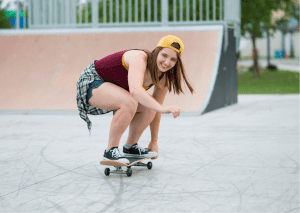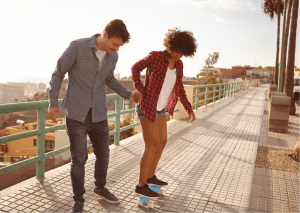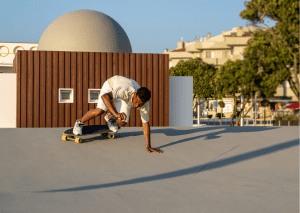Are you an adult learning to skate? It’s never too late to learn to ride your board even if you are a bit older and we want to show you how by getting the right training for a beginner rider like you! Remember learning to skate is fun no matter how old we are. As you go along reading this article, you will be able to learn how!

Whether you’ve admired skaters gliding effortlessly through skateparks or thought how cool it would be to learn a few skateboard tricks of your own, you can do it. You can start training now! Society says you’re ‘too old’, but age is just a number! With the right training, gear, and community support, anyone (even adults) can pick up skateboarding. Enroll in skateboarding lessons or join a summer camp to kickstart your skateboarding experience.
This content will encourage those who have always dreamed of learning how to skateboard and show them that it is never too late to learn skateboarding later in life. We have curated a set of skateboards, protective gear, training tips, and skateboarding support to assist you in your journey, so gear up for an exciting ride into the world of adult skateboard training! Join lessons, classes, and training, and participate in skateboarding classes, camps, and workshops, or celebrate with birthday parties that include skate lessons. There are many skateboarding apps available nowadays. You can download the app to practice at home and enjoy.
Key Takeaways
- Skateboard training can be very rewarding. You will improve your fitness, coordination, and confidence. You will also have fun and express yourself. You can train new tricks, such as ollies, kickflips, and grinds. You can also show off your skills on the ramps, rails, and ledges through skateboard lessons.
- Skateboarding is a great way to spend your free time. You can skate alone or with your friends and family. You can skate on the weekend or after work or school. You can skate for an hour or half a day. You can skate for fun, or competition. The choice is yours. Consider joining a summer camp or participating in lessons, classes, camps, and training to enhance your skateboarding experience. Those days of skateboarding experience are rewarding.
- Skateboarding is a sport that anyone can enjoy, regardless of age, gender, or background. All you need is a skateboard and head protection, and you’re ready to go. So what are you waiting for? Grab your skateboard and hit the streets. You’ll be amazed by what you can do with some training and passion. Check out Facebook, Instagram, and Twitter to stay connected and join a community of adult skaters.
- We believe that age is no barrier to success – and we want to help you make a step to get started! Whether it’s about selecting the right gear like trucks, wheels, decks, etc., or just starting slow and having patience, consider organizing birthday parties that include skate lessons or joining classes, camps, and training to learn skateboarding and embrace the joy of learning how to skateboard. Embrace the journey of skateboarding as adult skaters and see how much fun and rewarding it can be!
Adult Skateboard Basics & Skate Training
- Let’s first establish a solid foundation by understanding the basics. Skateboarding is like learning to ride a bike. It is vibrant and welcoming, offering many amazing benefits such as improved fitness, building community, and an overall sense of fun and personal growth.
- This article encourages everyone to get out there and try skateboarding so that we can continue to build this wonderful culture. As part of the skating family and organization, it’s important to have the right setup – from finding the perfect skateboard and protective gear to knowing the different types of skateboards and their uses.
- By equipping ourselves with the right knowledge and understanding, we can ensure that we get the most out of skateboarding and enjoy it safely and responsibly. So, let’s gear up for the next crucial part – picking out your perfect skateboard and protective attire.
Adult Skateboard Gear
In the realm of adult skateboarding and training, renowned skateboarders such as Tony Hawk, Lance Mountain, and Steve Caballero have significantly influenced the techniques and styles taught in skateboard lessons. These trainings cater to every skill level, from beginners using training wheels to advanced skateboarders seeking to enhance their skateboarding experience. Group lessons offer a collaborative and supportive environment, enabling skateboarders to become more confident on their skateboards. Those interested in elevating their skateboarding skills can sign up for these comprehensive and tailored trainings.
Choosing the right skateboard and gear, whether you go to a local skate shop or decide to shop online, can make a huge difference in the safety and enjoyment of your adult classes.
Here are three things to remember when selecting your skateboard and gear:
- Keep up with skateboard maintenance – A well-maintained skateboard provides a better ride.
- Don’t forget that gear customization isn’t just about looks – It can also improve comfort and safety.
- Remember, this is your journey – Choose gear that suits you and your style.
- Have proper training about skateboarding and proper training for gear.
Now that you have the right gear, let’s start learning how to skateboard and have some fun!
Skateboard Skill Trainings
- Now that we’ve mastered the art of choosing our gear, let’s get down to the real fun – learning how to ride your skateboard!

- We’ll start by understanding the basics, like how to stand on the skateboard and mastering key movements. Don’t worry if you’re feeling a bit wobbly – remember we were all beginners once, and with consistent practice, you’ll be cruising in no time.
How To Stand On A Skateboard
- Mastering your stance on your skateboard isn’t as intimidating as it might seem, especially when you’re armed with the right tips and tricks. Remember, achieving an ideal skateboarding posture is all about comfort and control.
- Discover balance techniques that work for you; practice by standing still before gradually adding movement. As we gain confidence, our focus will shift from merely standing to mastering movements in the next section.
- When it comes to standing on the skateboard, it’s important to consider the type of skateboard for skateboarding you’re using, the components that make up the skateboard, the style of skating you plan to do, and the skate videos you can watch to learn from others.
- Mastering the basics of how to stand on a skateboard is essential for enjoying this activity safely and comfortably.
Mastering Skating Movements
- Having established your perfect stance, it’s time to start learning the movements. Think of mastering these skills like a dance with your skateboard, but don’t forget to take care of it too.
- Moreover, it’s important to understand skatepark etiquette; and respect shared spaces and fellow skaters.
- Additionally, we touch on skateboard maintenance, safety, and etiquette. With patience and practice, you’ll soon be ready to take on the exciting challenges of advanced skating.
Do Advanced Skateboard Riding
- You’re up for a thrilling journey as you delve deeper into advanced training.
- Our advice to the readers and skateboarders? Pay attention to your diet and competition preparation.
- Remember, it’s not just about nailing tricks; it’s also about nourishing your body with healthy food and practicing consistently before the big day. And hey, we’ve all been there—wobbly knees, shaky confidence—but trust us, you’ll get stronger every day!
- Now let’s roll onto ensuring you stay safe while showcasing your new skills.
Skateboard Safety
- If you’re an adult learning skateboarding later in life, perfecting your ollies and kickflips is important, but safety should always come first. By wearing protective gear and brushing up on emergency protocols, you can ensure every ride is as exhilarating as it is injury-free.
- It’s important to not only equip skateboarders with the right safety gear but also to educate them on the rules and regulations of this sport and the basics of skateboard damage repair.
- Skateboarding activities such as cruising, downhill, freestyle, and freeriding, all come with inherent risks. Thus, it’s important to have the right safety gear for each activity, such as a helmet, elbow, and knee pads, and wrist guards. Skateboarders should also be aware of the local laws and regulations that govern skateboarding, such as speed limits, no skating zones, and skating hours.
- Skateboarding is an amazing way to stay active and have fun, but safety should always be the top priority. By following the necessary safety protocols and abiding by the rules and regulations, you can enjoy skateboarding your skateboard to the fullest while also staying safe.
Skateboard Community And Skate Park
- Diving into the vibrant world of skateboarding is not just about nailing tricks and cruising smoothly; it’s also about becoming part of an incredible community.
- Skateboarders are a passionate breed of individuals who come together to share their love and enthusiasm for the sport.

- We believe that understanding skatepark etiquette, participating in community events and activities, and connecting with other skateboarders and people are crucial steps toward integration and enjoyment.
- So don’t be shy! Show respect to others at the park, attend local events, and connect with other skateboarders – you’ll soon feel like a part of our skating family.
Conclusion
Skateboarding is not just for kids and teens. It is a fun and healthy activity that adults can enjoy too. Whether you are a skateboard beginner or a pro, you can find a skateboard that suits your style and budget. You can also choose from different types of skating, such as street skating, ramp skating, or freestyle skating.
Skateboarding is a great way to stay active, have fun, and even meet new people. It might seem daunting at first, but with patience and practice, we promise you’ll get there. Don’t forget to connect with the vibrant skateboard community for support and inspiration.
- So let’s hit the park together – or the streets, if you’re into street skating – it’s never too late to push your skateboards and start shredding!
Frequently Asked Questions:
How Do You Practice It?
- To start skateboarding, you will need some basic stuff, such as a skateboard, a helmet, and some protective pads. You will also need a smooth and flat ground to practice on. You can go to a skate park, a parking lot, or a sidewalk. Just make sure you follow the rules and respect other people and property.
-
- Start by getting comfortable with rolling on the skateboard. Find a smooth and safe area to practice skateboarding and rolling, and gradually work on maintaining balance and control as you get accustomed to the feeling of being on the skateboard. With consistent practice, you’ll build the foundation needed to learn various skills and tricks. Learning how to skateboard is a rewarding journey, especially for those embracing the thrill of riding a skateboard as an adult. If you’re an adult skater finding joy and fulfillment in skateboarding, it is a sign that you’re picking the right sport at any age.
What Age Is Too Late To Start Riding Your Board?
- There is no specific age that is too late to start skateboarding. Whether you’re a beginner learning to skateboard at a skate park, starting with your front foot or back foot forward, wearing elbow pads for protection, the thrill of learning new tricks on four wheels can be enjoyed at any stage of life.
How Do You Get Confidence In Learning To Skateboard?
- To gain confidence in learning to skateboard as an adult, start by practicing with friends who can support and encourage you. Enrolling in skateboard lessons or joining a summer camp can also be incredibly beneficial. Begin with the basics, like pushing with your feet, and gradually progress to more advanced tricks. Remember, this sport might seem intimidating at first, but with consistent practice and the right support, such as skateboarding lessons, classes, camps, and tutorials. You can also watch online tutorials on YouTube or download the app for skateboarding and practice. With these tips, it can become pretty easy to build confidence.
Am I Too Old To Learn How To Longboard?
- You are never too old to learn how to do skateboarding. Regardless of age and being an adult, learning how to skateboard can be a rewarding experience, and many skaters start at various stages of life. So, don’t wait; take that leap and start practicing your ollies and longboarding skills this week. Take skateboarding lessons. You’ll see that age doesn’t matter when it comes to enjoying the thrill of longboarding, just like the kids do! It doesn’t matter if you have less years of skateboarding experience. Embrace the skateboard as an adult and join the vibrant community of adult skaters.
How To Do It For Beginners?
- As a beginner, start by getting a proper skateboard, wearing protective gear, and practicing basic skills such as pushing with your feet and maintaining balance to gradually build confidence and progress to more advanced techniques.
- It can be challenging at first but don’t give up. Start learning how to skateboard and how to balance, push, turn, and stop on your skateboard. You will also learn how to control your speed and direction. You might fall a few times, but that’s part of the learning process. Just remember to get back up and try again. Joining a summer camp can provide structured learning and support in riding a skateboard as an adult
How Do You Teach Someone To Skate?
- When teaching someone to skate, it’s essential to emphasize safety first, guide proper foot placement and pushing techniques, and encourage consistent practice to help them gain confidence and improve their skills especially if you are an adult.
Can Anyone Learn How To Do It?
- Yes, anyone can learn how to skateboard! Regardless of age and years of skateboarding experience, with determination, practice, and the right guidance, anyone can enjoy the exhilarating experience of this sport and learn various tricks and skills.
Can I Learn It At 40?
- Yes, you can learn to skateboard as an adult at 40. Whether it’s your first time trying to learn tricks with your right foot or getting your gear from a local skate shop, age is not a barrier to learning to skate and enjoying the exhilarating experience of skateboarding.
Can I Learn It At 30?
- Yes, you can learn to skateboard at 30! Skating is a skill that can be acquired at any age, and with practice and determination, you can master tricks like the ollie and enjoy the camaraderie of skating with friends and skaters of all ages within a matter of weeks. Don’t wait any longer; grab a skateboard and join the fun, even if you didn’t start as a kid!
At What Age Did Yuzuru Hanyu Start With Her Skating?
- The provided entities do not contain any information about Yuzuru Hanyu or his age when he started skating. Yuzuru Hanyu is a Japanese figure skater who started his skating career at a young age, but the exact age is not mentioned in the given entities. For accurate information about Yuzuru Hanyu’s skating journey, it’s best to refer to reliable sources or biographies of the athlete.
How Do You Practice Skateboarding as an Adult?
Practicing skateboarding as adults involves spending time on a regular basis to advance your abilities, beginning with fundamental moves to develop confidence and balance. A skatepark can offer a secure setting for honing different skills. You can also improve your learning experience and advance your level at your own pace by taking a group lesson or picking up tips from a seasoned skater.
Can Anyone Pick Up Skateboarding At Any Age?
Yes. Many people learn skateboarding later in life and find it a good and rewarding hobby. The key is to start with the basics and gradually progress to more advanced skills, ensuring you wear proper safety gear. Adults can benefit from joining group lessons or skate clubs, which provide support and instruction tailored to different levels and ages.
How Can You Spend A Day At The Skatepark?
You can spend a day at a skatepark learning new tricks, mingling with other skaters, and taking in the full experience. Carry enough water, safety equipment, and your board. Keep an open mind to learn new skills. It’s a terrific chance to sharpen your abilities and keep up with the most recent news in the skating world because so many skaters love sharing their stories, updated news, and advice.
Last Updated on July 2, 2024 by Rejie Salazar
DISCLAIMER (IMPORTANT): This information (including all text, images, audio, or other formats on FamilyHype.com) is not intended to be a substitute for informed professional advice, diagnosis, endorsement or treatment. You should not take any action or avoid taking action without consulting a qualified professional. Always seek the advice of your physician or other qualified health provider with any questions about medical conditions. Do not disregard professional medical advice or delay seeking advice or treatment because of something you have read here a FamilyHype.com.